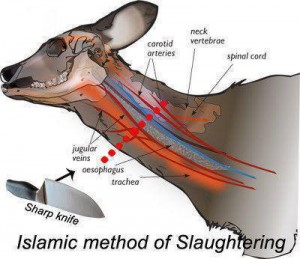Is Islamic Way of Slaughtering Brutal?
Research on Islamic Slaughtering and Western method of Slaughtering
Let’s begin with a small introduction with the term HALAL
What is Halal?
Halal is an Arabic word meaning lawful or permitted. The opposite of halal is HARAM, which means unlawful or prohibited. Halal and haram are universal terms that apply to all facets of life. However, we will use these terms only in relation to food products, meat products, cosmetics, personal care products, pharmaceuticals, food ingredients, and food contact materials.
While many things are clearly halal or haram, there are some things which are not clear. Further information is needed to categorize them as halal or haram. Such items are often referred to asmashbooh, which means doubtful or questionable.
All foods are considered halal except the following (which are haram):
- Swine/Pork and its by-products
- Animals improperly slaughtered or dead before slaughtering
- Alcoholic drinks and intoxicants Carnivorous animals, birds of prey and certain other animals Foods contaminated with any of the above products,
Foods containing ingredients such as gelatin, enzymes, emulsifiers, and flavors are questionable (mashbooh), because the origin of the ingredients is not known.
Let’s now move into the topic.
The Islamic practice of slaughtering animals by means of a sharp cut to the front of the neck has frequently come under attack by some animal rights activists as being a form of animal cruelty, the claim being that it is a painful in human method of killing animals. In the West, it is required by law to stun the animals with a shot to the head before the slaughter, supposedly to render the animal unconscious and to prevent it from reviving before it is killed so as not to slow down the movement of the processing line. It is also used to prevent the animal from feeling pain before it dies.
German Research Studies Pain
It therefore may come as a surprise to those who have made such acclimations to learn of the results of a study carried out by Professor Wilhelm Schulzeand his colleague Dr. Hazim at the School of Veterinary Medicine, Hannover University in Germany. The study: ‘Attempts to Objectify Pain and Consciousness in Conventional (captive bolt pistol stunning) and Ritual (halal, knife) Methods of Slaughtering Sheep and Calves’ concludes that Islamic slaughtering is the most humane method of slaughter and that captive bolt stunning, practiced in the West, causes severe pain to the animal.
In the study, several electrodes were surgically implanted at various points of the skull of all animals, touching the surface of the brain. The animals were allowed to recover for several weeks. Some animals were then slaughtered by making a swift, deep incision with a sharp knife on the neck cutting the jugular veins and the carotid arteries as well as the trachea and esophagus (Islamic method). Other animals were stunned using a Captive Bolt Pistol (CBP). During the experiment, an electroencephalograph (EEG) and an electrocardiogram (ECG) recorded the condition of the brain and the heart of all animals during the course of slaughter and stunning.
The results were as follows:
- Islamic Method When you slaughter in Islamic way the blood is drained from the flesh, where as other method of killing clots the blood and 45 percent of the blood remains in the flesh, hence eating such meat is highly dangerous to health, especially kids.
- The first three seconds from the time of Islamic slaughter as recorded on the EEG did not show any change from the graph before slaughter, thus indicating that the animal did not feel any pain during or immediately after the incision.
- For the following 3 seconds, the EEG recorded a condition of deep sleep – unconsciousness. This is due to the large quantity of blood gushing out from the body.
- After the above-mentioned 6 seconds, the EEG recorded zero level, showing no feeling of pain atall.
- As the brain message (EEG) dropped to zero level, the heart was still pounding and the body convulsing vigorously (A reflex action of the spinal cord) driving a maximum amount of blood from the body thus resulting in hygienic meat for the consumer
- December 08, 2013
- 0 Comment

